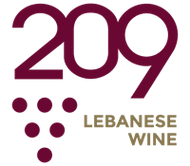209 x Lebanese Wineries
The south is blooming with the vines
Marjeyoun; a beautiful region, a new spot for the first winery in the South of Lebanon and a new touristic location. When Carol Khoury, the owner of the winery came...
Magical like a shooting star
Made with pure passion, Chateau Khoury has perfected the perfect red wine. Made with the best pick (following rigorous selections) of Syrah, Cabernet Sauvignon, and Merlot; the “Perseides” is a...
Château Heritage is one of the oldest wineries in Lebanon and remains a people’s favorite, with good reason.
Now being at the hands of fourth-generation wine maker, Dr. Dargham Elias Touma, the winery is a combination of old knowledge/family secrets and novel technological mastery making the bottles the...
Cave du Monastère St.Jean: A Story of History & Wine
On one of the many hillsides of the Metn region of Lebanon, lies the historical Cave du Monastere St Jean, in the beautiful village of Khenchara.Today the winery is over...
Domaine des Tourelles: Faouzi Issa's Playground
Domaine des Tourelles was founded in 1868 by Frenchman François-Eugène Brun whose family owned and ran the winery up until 20 years ago, when the Issa and Issa El Khoury...
Latourba: It starts with the soil
Deep in Saghbine, overlooking Lake Qaraoun in the West Beqaa, lies Latourba winery, nestled at the crossroads of the ancient wine trade that travelled from Haifa to Baalbek. In this...
Sept Winery: Going Back to the Roots
Maher Harb is a young winemaker who often finds himself being a listener of the universe’s hidden stories. Sept is his personal story, a story of passion, a dream he’s...
Women in the Lebanese Wine Industry
We love the month of March because it's all about celebrating women! Celebrating their beauty, their strength, their power and their light.With that mind, we wanted to shed light on...
Riachi Winery & Distillery: A promise to the ancestors
It all started in 1839 when Roy Riachi’s ancestors passionately built their first “khommara” to produce alcoholic beverages and sell them to the neighboring villages of Khenchara – and the...
The Sobbaghieh
Sobbaghieh from the word "Sabgha" meaning dye in Arabic, is a rare dark-skinned red wine grape native to Lebanon. It belongs to the "Tinturier" grape variety, characterized by its red-colored...
Château Oumsiyat: Where tradition meets the future
In perhaps one of the most photogenic enclaves of the Mtein region of Lebanon, the Bou Sleiman Family has been making wine since the 1950’s. Joseph and Cynthia Bou Sleiman are...
With love, from Batroun Mountains
Throughout their early working years, Assaad and Katy Hark would wake up, day after day, with their lifelong dream always in mind: to go back to their homeland and make wine....













